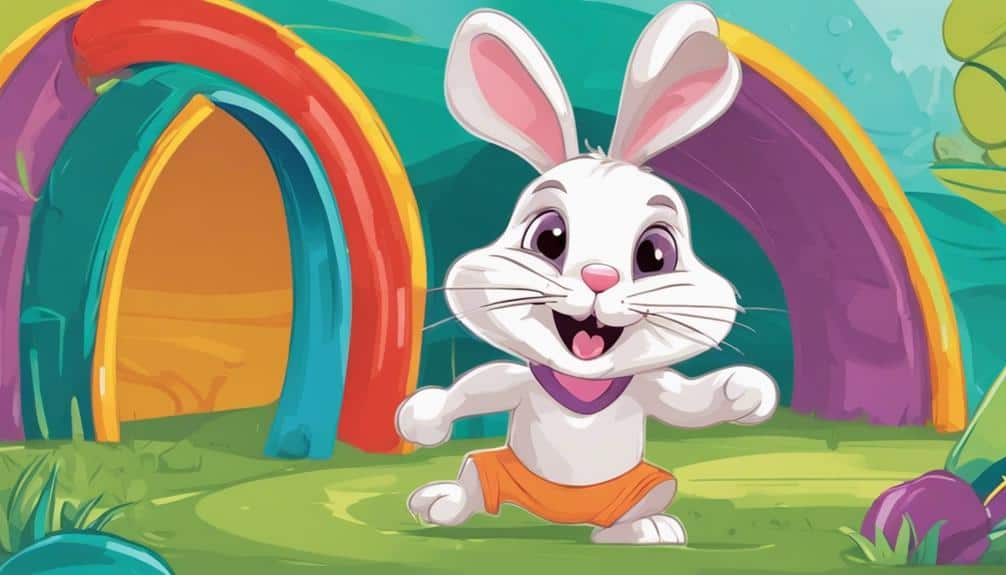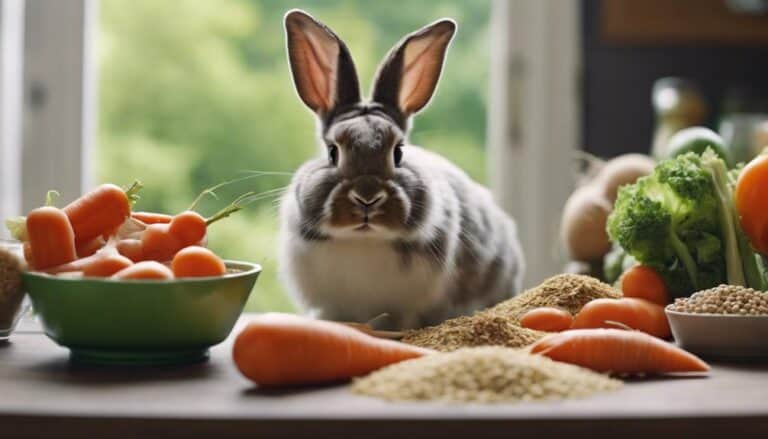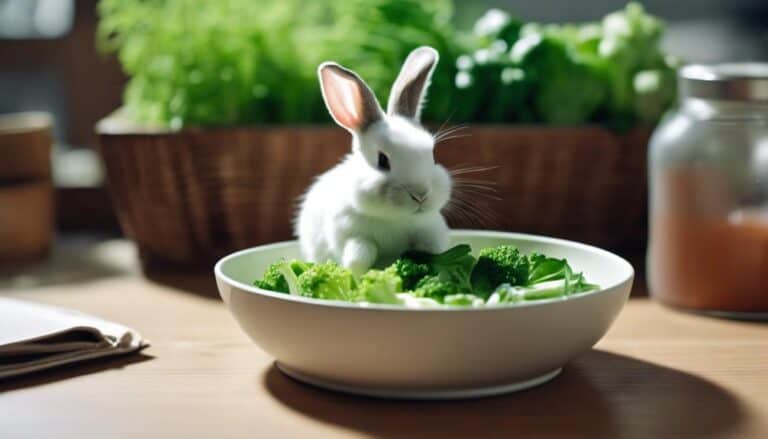If you've noticed your bunny gaining a bit of extra weight despite your best efforts, you might be wondering how to help them shed those pounds effectively.
By focusing on three key aspects—diet, exercise, and weight monitoring—you can set your bunny on the path to a healthier lifestyle.
Implementing small changes in these areas can make a significant difference in your bunny's weight management journey.
Contents
Key Takeaways
- Monitor weight and body condition regularly to track progress effectively.
- Prioritize gradual weight loss to ensure long-term health and well-being.
- Consult a vet for guidance on diet and exercise tailored to your bunny's needs.
- Establish consistent routines and seek professional advice for successful weight management.
Assessing Your Rabbit's Weight

When evaluating your rabbit's weight, it's important to pay attention to specific indicators that can help determine their ideal body condition. Start by gently feeling your rabbit's ribs, spine, and hip bones. Ideally, you should be able to feel these bones without excess fat covering them. A pot belly or a body that appears disproportionate to the head could indicate that your rabbit is overweight. Take into account your rabbit's breed standards and coat thickness when gauging weight, as these factors can influence what the ideal weight should be.
If you're unsure about your rabbit's body condition, consult a vet for advice. They can help you use a body condition score system for a more accurate evaluation. Regularly monitoring your rabbit's weight and making adjustments to their diet and exercise routine is essential for preventing obesity and maintaining a healthy weight. Remember, a healthy rabbit is a happy rabbit, so always prioritize their well-being when it comes to food and body condition.
Tailoring the Diet Plan
To effectively manage your rabbit's weight, the first step is tailoring a diet plan that prioritizes essential fiber from hay while controlling calorie intake by limiting high-calorie pellets and incorporating fresh vegetables. Here's how to tailor the diet plan for your rabbit:
- Consult a Vet: Before making any significant changes to your rabbit's diet, consult a veterinarian to determine the appropriate amount of pellets based on your rabbit's current weight and health status.
- Gradual Dietary Changes: Introduce healthier dietary changes gradually to prevent digestive issues and guarantee your rabbit accepts the new foods without any problems.
- Monitor Weight: Keep a close eye on your rabbit's body weight and adjust the diet plan accordingly. Regular monitoring will help you track progress towards weight loss goals and make necessary adjustments to support your rabbit's health.
Incorporating Exercise Into Routine

Incorporate various stimulating activities into your rabbit's daily routine to guarantee they get the necessary exercise for maintaining a healthy weight. Rabbits require a minimum of 3 hours of exercise each day to stay fit and healthy.
Encourage movement by providing opportunities for digging, jumping, and exploring within their living space. Stimulating your rabbit's foraging instincts by hiding food in different areas can also promote physical activity. Utilize rabbit-safe toys, tunnels, and obstacles to keep them engaged and moving.
Adding different levels and structures in their living environment can encourage jumping and overall movement. By incorporating these elements into your rabbit's daily routine, you make sure they've the opportunity to engage in natural behaviors that will help them stay active and maintain a healthy weight.
Frequently Asked Questions
How Can I Reduce My Rabbit Weight?
To reduce your rabbit's weight, focus on a healthy diet with limited pellets and more hay, establish an exercise routine, practice portion control, create a weight loss plan, offer treat alternatives, schedule regular check-ups, set food restrictions, monitor activity levels, assess body condition, and consider supplement options.
How Long Does It Take Rabbits to Lose Weight?
Losing weight can take rabbits around 3-6 months. Consistent exercise routines and diet plans are key. Monitoring weight loss progress, providing healthy snacks, ensuring daily activity, controlling portions, promoting water consumption, offering treat alternatives, and observing behavior changes are essential.
How Do You Treat an Obese Rabbit?
To treat an obese rabbit, start with dietary changes, exercise routine, and portion control. Consult a vet for a personalized plan. Watch for health risks, monitor weight loss, and consider behavior modification. Create a support system for success.
What Does an Overweight Rabbit Look Like?
If your rabbit is overweight, you may notice a round face, distended belly, unkempt appearance, and reduced activity. Their fur condition might suffer, and they could have difficulty breathing or grooming. A vet can confirm excess fat.
How does Balancing Hay for Bunnies Contribute to Bunny Weight Management?
Balancing hay for bunnies is essential for their weight management. Providing the right amount of hay helps to keep bunnies feeling full and satisfied without overeating. This high fiber diet also promotes healthy digestion and prevents obesity in rabbits. Balancing hay for bunnies is key to keeping them in optimal condition.
Conclusion
To guarantee your bunny's weight is as important as nurturing a delicate flower garden.
By evaluating their weight, tailoring their diet, and incorporating exercise, you can make sure their well-being blossoms like a vibrant sunflower in full bloom.
Remember, just like a gardener tends to their plants with care and attention, your bunny's health is in your hands.
Keep them healthy and happy, and watch them thrive like a garden in springtime.






